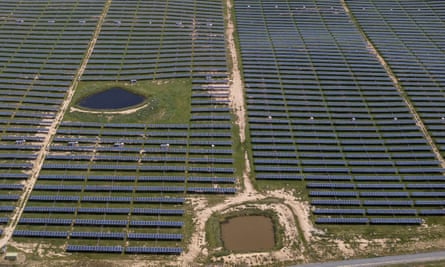Extract from The Guardian
Survey suggests the corporate community is increasingly at odds with the Morrison government’s gas-led recovery

Last modified on Thu 22 Oct 2020 03.31 AEDT
Company directors want a more radical policy reset to recover from the Covid-19 recession including bigger investments in infrastructure, reforms of industrial relations and a Green New Deal.
The Australian Institute of Company Directors’ sentiment index, released on Thursday, found that climate and energy policy remain the two most important short-term priorities for company directors.
With three-quarters (76%) of directors calling for large-scale public investment in renewable energy and greening the economy, the results suggest the corporate community is increasingly at odds with the Morrison government approach of a gas-led recovery without significant renewable investments.
Overall director sentiment remains in pessimistic territory in the second half of 2020 but it has recovered 22.4 points to minus 37.2.
Directors are overwhelmingly negative in Victoria, which is coming out of stage four lockdown, where only 5% are feeling optimistic and 80% are pessimistic.
In the short term, directors would like the federal government to focus on climate change (45%) and energy (43%), followed by tax reform (34%), infrastructure (32%) and productivity growth (30%). In the long term, climate and energy also top the list.
Asked about infrastructure priorities, the most popular responses were renewable energy, regional infrastructure and telco networks including the national broadband network.
Company directors encouraged the government to pursue radical changes rather than sticking with its election mandate, with majorities in favour of innovation, research and development and skills (92%), high-speed and inland rail (77%), and a “more radical policy agenda on industrial relations reform to increase labour market flexibility” (70%).
The AICD managing director and chief executive, Angus Armour, said the results “serve as a reminder that notwithstanding the challenges of Covid-19, Australia still needs to address the political impasse that is climate and energy policy”.
Armour did not reject the gas-led recovery, but in comments to Guardian Australia he said the data showed a “clear desire for investment in green technology”.
Although the first priority in the budget was job creation, the government should now “be bold” and “take confidence” from the results that the business community wants it to seize the opportunity to reset policy, he said.
In September, Scott Morrison released a technology roadmap listing “clean” hydrogen, energy storage, “low-carbon” steel and aluminium, carbon capture and storage and soil carbon as priority technologies. The government continues to back gas not just as a transition fuel but a growth industry.
Morrison has refused to commit to net zero emissions by 2050, despite widespread support for the target from state and territory governments, business groups and the National Farmers Federation.
In the budget reply, Labor proposed a $20bn off-budget investment to establish a government-owned entity, Rewiring the Nation Corporation, to rebuild and modernise the electricity grid. It has also offered the Coalition to develop a bipartisan energy policy.
Armour said on an issue such as industrial relations there would not be unanimity among directors on which reforms to pursue, but there is “an appetite for a significant reform agenda” to address problems that existed pre-pandemic including “productivity and the lack of innovation”.
The industrial relations minister, Christian Porter, has signalled the government will take a more incremental approach, pursuing reforms that can pass the parliament and achieved consensus in talks including project-life pay deals for new work sites and the definition of casual employees.
The AICD survey shows that fewer directors are concerned about health, with 23% now listing it as a short-term priority in the second half of the year, down from 38% in the first half.
Interest in engagement with Asia is up from 13% in the first half of the year to 25% in the second half.
Directors rated the economic prospects of regions around the world negatively, with the exception of China, which 34% of directors rated positively and 27% negatively.
No comments:
Post a Comment